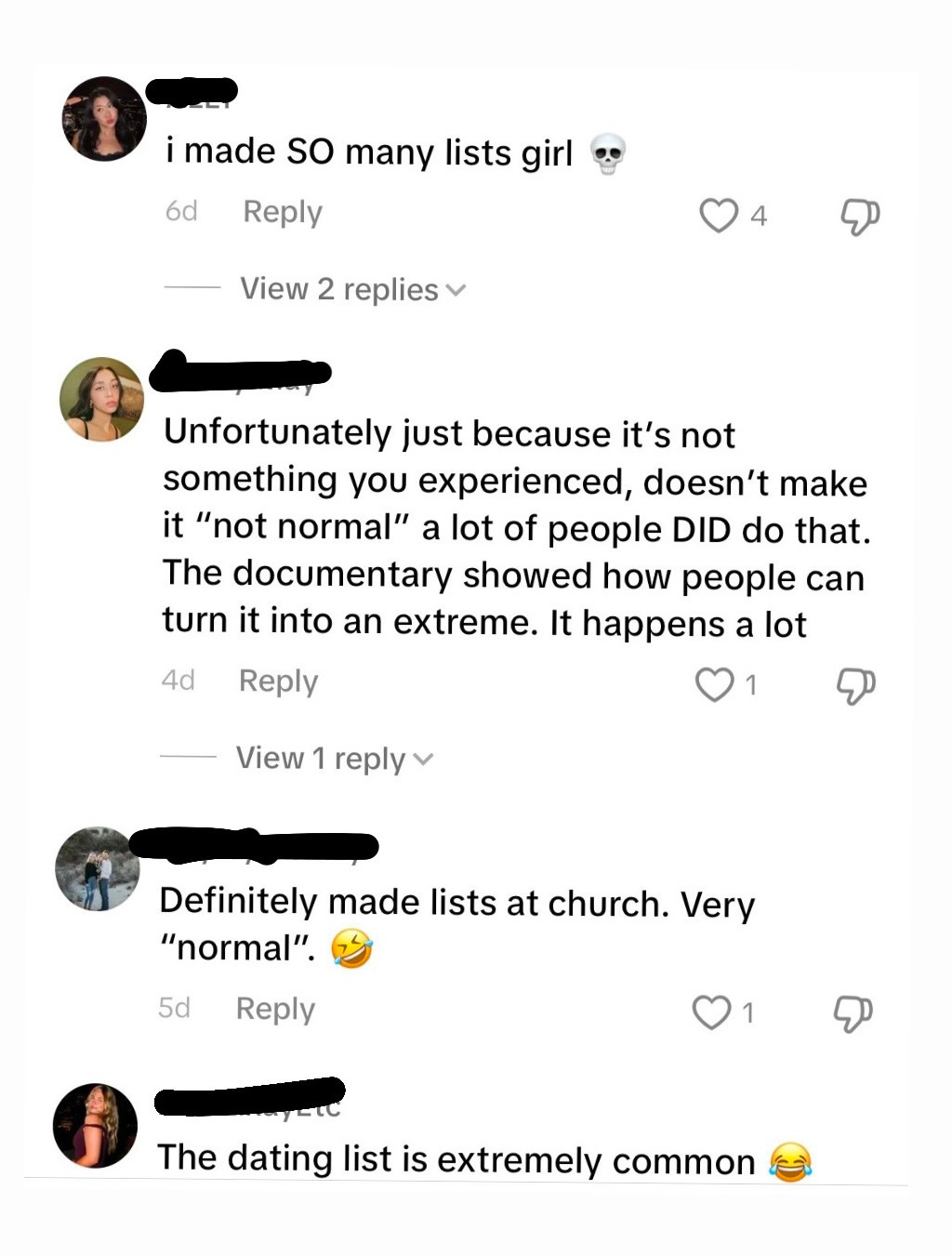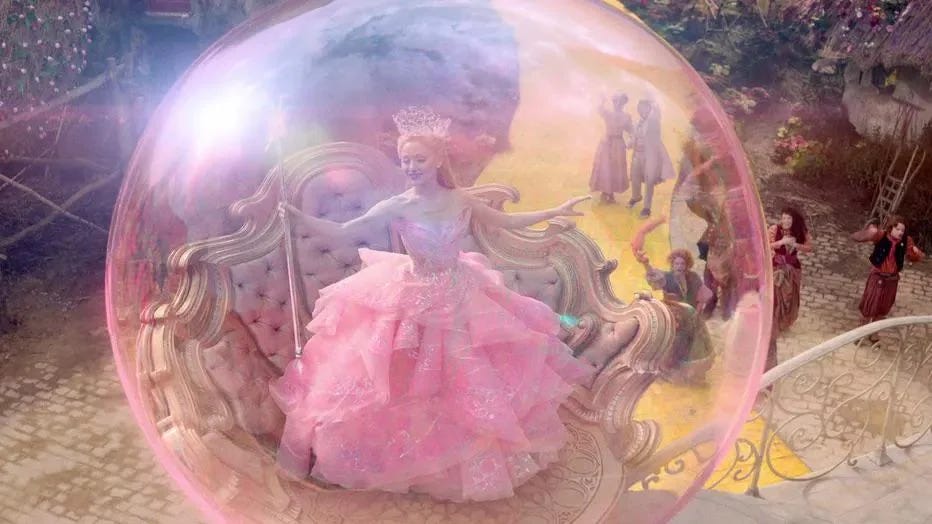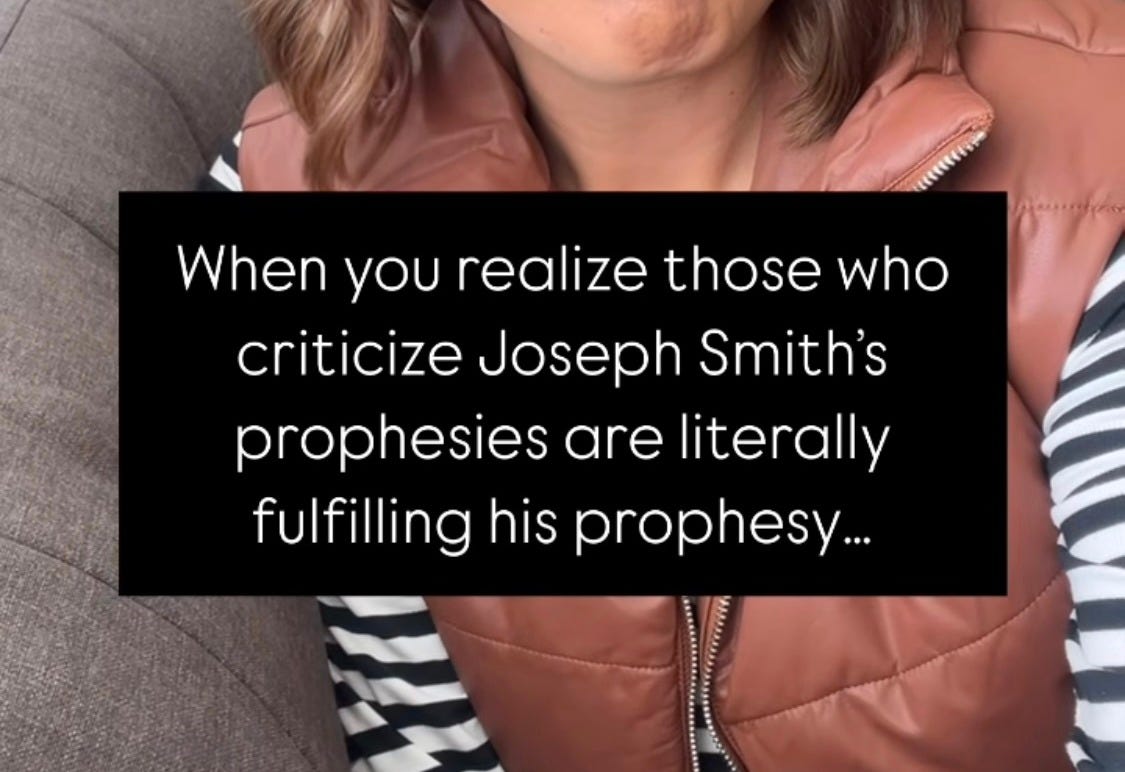Influencers in the Wild (West)
An essay about LDS influencers, the Ruby Franke "lists", mormon severancing and our inability to look upstream.
Last summer I found myself standing on a curb in Kamas trying to buy last-minute tickets off a man who I assume, based on the swarm of people coming up to greet him, was revered in town. Like the cursory planner that I am, I messed up the location of a kids’ rodeo—Oakley in Idaho, not Utah. To make things right, I had to find seats to the next-best thing in town: Kamas’ Demolition Derby.
The parking lot felt like the set of Mad Max meets a MAGA small-town blockbuster. The overhead speakers were blasting a mix of country music and that flavor of pop music usually reserved for firework shows. People were dressed in blue jeans, old tees and worn cowboy boots. As we made our way to the arena, we were welcomed by an enormous Trump flag atop a derby car—wasn’t sure if it was decor or marking territory. We made our way to the bleachers. Looking around I couldn’t recall the last time I had been surrounded by this many patriotic people. Or American flags. VROOM VROOM. The derby’s engines ripped through crowd; the roar of rural conservatism filled the air.
Looking over the details of the derby online, front and center was the sponsor in big black, calligraphy ink: Ballerina Farm.
Earlier that summer, in that one controversial Times article, Hannah and Daniel were asked about politics. Hannah said:
“We try so hard to be neutral and be ourselves and people will put a label on everything. This is just our normal life.”
This is the same interview where Daniel was regurgitating anti-abortion talking points. While, it’s true that Hannah is not posting her local rep’s contact info on her IG stories, their family homestead is not absolved from politics. Both farming and procreating are huge political conversations right now. While it’s easy to equate silence as neutrality, the thing about personal politics is they don’t need verbal recognition to have power. Our actions and beliefs have an impact. And I’m noticing how this resistance to connecting these larger systemic dots are really coming at quite a cost to many in the online LDS influencing world.
This week, a well-loved utah influencer who put missionary homecomings on the IG map, went online to try to tackle the Ruby Franke discourse. A snippet of her family’s youtube videos were used in the Devil in the Family: The Fall of Ruby Franke documentary and she was understandably upset to be associated with such a dark, demented storyline—even for two milliseconds.
What I find most interesting is rather than tackling the larger questions at hand (i.e. family vlogging, child safety, mormonism)—this vlogger quickly pivoted from the hurt she was feeling to “debunking” two very random details of the series because as she said, “I share the same faith”. One—she brushed off the attribute lists Ruby made while dating saying, “That’s not a normal thing” for mormons to create lists of characteristics of their future spouses. And two—she questioned the relationship between creating family youtube content and getting closer to god,“I have never been taught that, and that’s quite frankly not what we believe”.
Within days, hundreds of people responded to this LDS creator explaining that—one—making attribute lists are a very common practice in mormonism, unfortunately. The comment section was full of confessionals. I saw someone go so far as to say they made cardboard cutouts of their future husbands in Achievement Days. When I was a Beehive, we put our lists in a mason jar along with magazine cutouts of other wedding details like dresses and rings. The idea was to open this jar right before we got married.
In a clarifying comment, this influencer said she was referring to the chart Ruby made which was a poster-sized chart with the potential suitors she was dating on one axis and the attributes she was looking for on the other. Which, when you consider how aggressively the church sells marriage and motherhood to young women, the chart is a relatively benign symptom of such an environment. I have dozens of pro-and-con lists in my journals from when I dated because I truly believed my proximity to a man was the single most important decision I’d ever make. The only real difference between mine and Ruby’s list is she was more organized and color-coded.
To her second point about vlogging, the documentary plucked out a quote from M Russell Ballard saying, “This the most important work to join the conversation by participating on the internet.” Serious question. Have you ever looked up family vlogging on youtube? The mormon presence is potent. Like, genuinely shocking, but it shouldn’t be. One—we’re a family-centered people. As Harold B. Lee said, “The most important of the Lord’s work that you will ever do will be the work you do within the walls of your own home.” Two—online influencing is a pretty ideal way for a SAHM who is wanting to bridge the gap of running a household and earning money. Three—we’re performers, baby! We were singing and bearing our testimonies for our neighbors at the ripe age of three—and it never really stopped. Lucky for us, the audiences just got bigger and so did our convictions.
Not only is it in our blood to be full-time missionaries, but the Church has issued org-wide social media campaigns like “I’m a Mormon” and “Share Goodness” where members were encouraged to share their testimonies. We’ve gone so far as to now allow missionaries access to this virtual tool to help with their proselyting efforts. So, maybe her vlogging argument is one of semantics, but the waters become even muddier when you consider how some have brought up the time the LDS Church flew both this creator and her husband to New York City in 2023 to document the mormon nativity in Times Square. While it may’ve not strengthened her testimony (which i think she’s hinging her critique on), she did monetarily profit from using her channel to promote religious propaganda…which, again, feels a bit rich.
I think the most disorienting thing about this whole exchange is that this was never the conversation to be had in the first place. Why, after watching a documentary of one of the most public child abuse cases coming out of the state of Utah are we exchanging YW “list-making” stories in the comment section? Point for mormonism. Can a plot be lost if it was never found in the first place?
Please, don’t mistake this essay as being about any specific LDS influencer. It’s not. This conversation is about the way we as LDS people get swallowed whole—Jonah and the whale style — in these larger idealogical debates because we’ve never been afforded the ability to think systemically. It’s the way we’ll claim political neutrality while endorsing an organization that does not allow women to hold executive positions, opposes elective abortions and excludes gay marriage from their menu of services. It’s our eagerness to distance ourselves from mormon-affiliated abuse cases by focusing on all the things that made the villains different. Like clockwork, we’ll fixate on the symptoms (i.e. “the lists”), to keep us from looking upstream at the actual problem— in this case how children will suffer the most under unregulated religious and technological rules.
It’s a pattern!! CTRL C, CTRL V, REPEAT!
Last week I was listening to Caro and Sara, two smart women who I can’t say enough about, speak about the Ruby Franke documentary. I kept getting distracted by some of their commentary as I was reminded that these are two people who are engaging with this stick-pull, charismatic joe schmo religion intellectually, and not emotionally. I think there’s an element of me that wishes I didn’t feel the jaws of intellectual abandonment disguised as mormon god so intensely. Maybe I’d have more of a leg-up in being able to understand what’s happening to my friends and so many of the LDS influencers around me. We ought to be talking about fascism and how to extend community care across class and yet me and my mormon kin can’t seem to get off the merry-go-round of the bi-annual debates on whether or not an exclusive pair of underwear prescribed and policed by men is an infringement on bodily autonomy.
Mormonism breeds a severancing of sorts. In the same way we “shelf” and compartmentalize the confusing beliefs of mormonism to make sense of the chaos, I believe our bodies are subjected to the same process. We hide, reject and even “pray away” parts of ourselves in order to belong to such a homogenous, rule-abiding community. Through this LDS-coded Lumon process, our self-awareness becomes deeply compromised (Insert the “I’m sorry for what I said when I was mormon” tees). Truthfully, how are we expected to perceive how our actions are affecting others when we can’t stop lying to ourselves? Thrust this mormon bubble of development into the real world and we come to find that —generally speaking— we make very weak debaters who are riiiipe for conspiracy theories.
This week a reel popped up on my feed from another large LDS influencer. The video featured her looking into the camera with gotcha eyes and the words:
In my opinion, no amount of debate in the comment section will make a difference. She has effectively called stalemate on her own intellectual integrity and, at this point, it’s a matter of how many straws her camel’s back can hold before any reasonable conversing will take place.
I’m sad for us. I want us free. I want us fierce. I want us thinking critically. It’s hard to watch influencers build a new world for themselves online to only defer back to the rules of such a small, insecure game like mormonism. Having spent decades watching mormon women get steamrolled and side-eyed in the carpeted sphere, I don’t find any satisfaction in watching this same dynamic be perpetuated online too. And this is the weird thing about grief. For years, I could hardly look at the accounts of influencers defending our home-grown oppressive beliefs. It was too triggering. Yet in the churning of tides, I’m feeling a tug to want to support this community in our unique battle over our minds and autonomy—because I’m not out of the woods either.
Sitting in the nosebleeds, chain link fence to my back, I had a bird’s eye view of the derby cars coming on and off of the dirt-filled arena. I watched family and friends rush behind the bleachers to celebrate their drivers in their homemade, pummeled cars. The air of this mormon town was buzzing with neighborly affection. Friends introducing new friends. People waving and smiling at each other from across the bleachers. I felt that pit of communal envy in my stomach. There’s some beauty under this mess. And by god, I hope we can dig ourselves out.











So good Chelsea. It’s all such a mess. My dad will die on the hill that I left Mormonism because I got swayed by anti-Mormon propaganda. But like…I could basically say the same thing back to him, just take out “anti.” It’s so disheartening to see what lack of critical thinking does to people, as well as this obsessive need people have to defend doctrine and dogma. (Of course, the system trained us to do that). The Hamakers’ story this week also highlights what happens when you think critically…you’re seen as a threat and removed from the system. I wish us all to be free.
Damn, you always tie it all together so beautifully! Thank you for this!